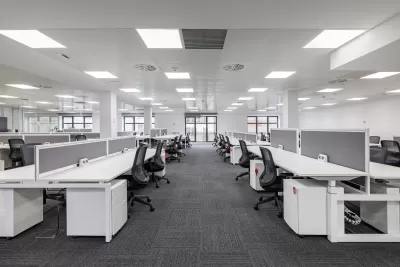To encourage more housing production, lawmakers could help make the costly and time-consuming adaptive reuse process easier and more cost-effective.

During the height of the Covid-19 pandemic, the potential for converting offices, hotels, malls, and other commercial buildings to housing became a hot topic as occupancy rates in office buildings plummeted and, in many cases, have remained low as the pandemic wanes. With office vacancy rates at a 30-year high, developers and housing advocates saw the possibility in adaptive reuse to create a win-win situation amidst a deepening housing crisis.
As Erika Bolstad explains in Next City, the conversion of offices to housing is more complicated and expensive than it seems at first glance, but new legislation at the local, state, and federal levels could make the process easier and less costly.
In Oregon, legislation proposed by Rep. Pam Marsh would “would require the state’s larger cities to allow commercial-to-residential conversions without mandating zoning changes or conditional use permits” and local governments to waive development fees. “In California, state Assemblymember Matt Haney, a Democrat from San Francisco, introduced legislation to bar local officials from delaying or denying commercial-to-residential projects.” Washington, D.C. developers can receive a 20-year tax abatement for commercial-to-housing projects.
Despite the efforts made by states and cities, office conversion remains “a fringe trend at best,” for now, but recent legislative changes could tip the balance in favor of more conversions.
FULL STORY: Converting Offices To Housing Is Hard. These Changes Could Make It Easier.

Alabama: Trump Terminates Settlements for Black Communities Harmed By Raw Sewage
Trump deemed the landmark civil rights agreement “illegal DEI and environmental justice policy.”

Study: Maui’s Plan to Convert Vacation Rentals to Long-Term Housing Could Cause Nearly $1 Billion Economic Loss
The plan would reduce visitor accommodation by 25% resulting in 1,900 jobs lost.

Planetizen Federal Action Tracker
A weekly monitor of how Trump’s orders and actions are impacting planners and planning in America.

Wind Energy on the Rise Despite Federal Policy Reversal
The Trump administration is revoking federal support for renewable energy, but demand for new projects continues unabated.

Passengers Flock to Caltrain After Electrification
The new electric trains are running faster and more reliably, leading to strong ridership growth on the Bay Area rail system.

Texas Churches Rally Behind ‘Yes in God’s Back Yard’ Legislation
Religious leaders want the state to reduce zoning regulations to streamline leasing church-owned land to housing developers.
Urban Design for Planners 1: Software Tools
This six-course series explores essential urban design concepts using open source software and equips planners with the tools they need to participate fully in the urban design process.
Planning for Universal Design
Learn the tools for implementing Universal Design in planning regulations.
Caltrans
Smith Gee Studio
Institute for Housing and Urban Development Studies (IHS)
City of Grandview
Harvard GSD Executive Education
Toledo-Lucas County Plan Commissions
Salt Lake City
NYU Wagner Graduate School of Public Service





























